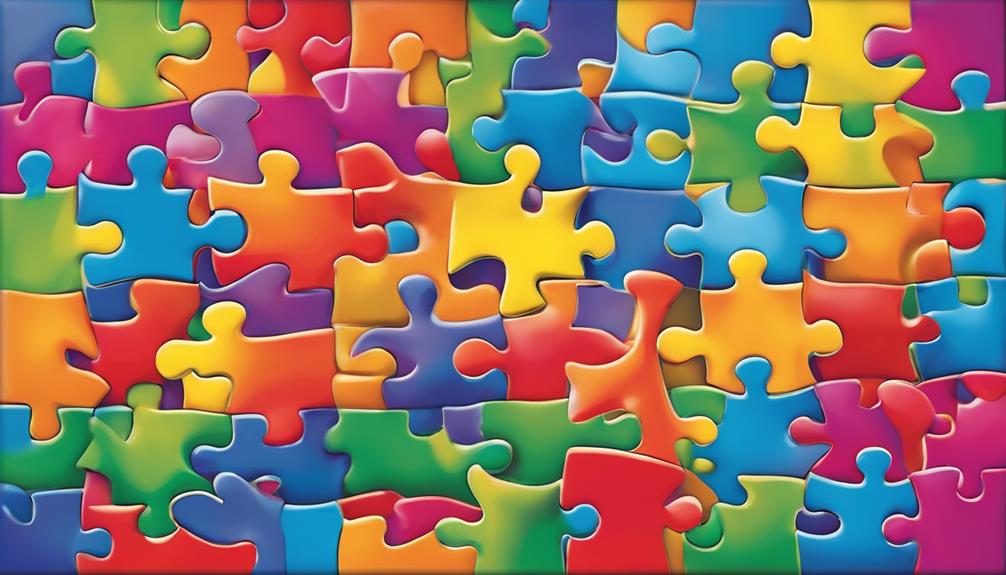When delving into the realm of Enneagram types that INFPs frequently connect with, it is commonly said that “birds of a feather flock together.”
The intricate tapestry of personalities that INFPs encompass finds resonance in several Enneagram classifications, each offering a unique lens through which to view these individuals.
From the emotive and introspective qualities of Enneagram 4 to the peace-seeking nature of Enneagram 9, the connection between INFPs and these types unveils a captivating narrative.
Join us as we unravel the intricate web of Enneagram types that commonly intertwine with the INFP persona, shedding light on the depths of their complexity.
Key Takeaways
- INFPs often resonate with Enneagram Type 4 and 9 for their emphasis on uniqueness, authenticity, and harmony.
- Growth opportunities for Type 9 INFPs include cultivating inner harmony, practicing assertiveness, and setting boundaries.
- Enneagram Types 2 and 5 offer compassion and support, aligning with INFPs' values of empathy and care.
- INFPs also find connections with Enneagram Types 6, 1, 7, and 8, reflecting shared values like security, activism, energy, and assertiveness.
Enneagram Type 4: The Individualist
Among INFPs, the Enneagram Type 4, known as the Individualist, resonates deeply due to its emphasis on uniqueness and authenticity. INFPs who align with Enneagram Type 4 are often introspective and creative individuals who seek to express their innermost thoughts and emotions through various artistic mediums like writing, music, or art. This type values authenticity above all else, striving to showcase their true selves to the world.
The INFP Enneagram 4 is on a continuous journey of self-discovery, often grappling with profound feelings of melancholy and a persistent longing for deeper meaning in life. Their intense emotions drive them to explore the depths of their identities, pushing them to create and innovate in ways that reflect their inner complexities.
To support their well-being, practices that foster self-compassion and self-acceptance can be particularly beneficial for these individuals as they navigate the intricate landscape of their emotions and creativity.
Enneagram Type 9: The Peacemaker

As INFPs, we resonate deeply with the qualities of Enneagram Type 9, known as The Peacemaker. Our inclination towards maintaining harmony and unity in relationships aligns with Type 9's core desire for peace and stability.
Exploring the traits, how they connect with our INFP nature, and the growth opportunities within this Enneagram type can offer valuable insights into our peacemaking abilities and our journey towards personal development.
Type 9 Traits
Type 9 Traits, also known as Enneagram Type 9: The Peacemaker, embody a deep-rooted desire for harmony, stability, and inner peace. Here are some insights into the characteristics of Type 9 individuals:
- Conflict Avoidance: Type 9s fear discord and prioritize maintaining peace at all costs.
- Empathetic Nature: They're known for their open-minded and empathetic approach towards others' perspectives.
- Calming Presence: Type 9s often bring a sense of tranquility and harmony to group settings.
- Tendency Towards Withdrawal: When faced with conflict, they may struggle with feelings of numbness and a desire to retreat into solitude.
Understanding these traits can provide valuable insights into the inner workings of Type 9 individuals and their quest for inner peace and harmony.
INFP Connection
INFPs who resonate with Enneagram Type 9, known as 'The Peacemaker,' often embody a deep appreciation for harmony and inner stability in their lives. This connection arises from our shared values of empathy, compassion, and a strong desire for unity. As Type 9 individuals, we excel in conflict avoidance, preferring to maintain peace both within ourselves and in our relationships.
Our natural inclination towards tolerance and understanding allows us to navigate diverse perspectives with grace. However, this harmonious nature can sometimes lead to indecision, as we strive to uphold inner tranquility. Through our innate ability to foster compassion and promote peace, Type 9 INFPs create environments where empathy and acceptance flourish.
Growth Opportunities
When seeking growth opportunities, individuals embodying Enneagram Type 9, 'The Peacemaker,' can benefit from embracing their inner strengths and learning to assert themselves when necessary. Here are four key ways Type 9 INFPs can enhance their personal development:
- Cultivate Inner Harmony: By prioritizing self-awareness and understanding their emotions, Type 9 INFPs can foster a deeper sense of inner peace and balance.
- Practice Assertiveness: Stepping out of their comfort zone and expressing their needs and opinions can help Type 9 INFPs avoid feeling overlooked or unheard.
- Engage in Constructive Conflict Resolution: Learning to navigate disagreements constructively can empower Type 9 INFPs to handle conflicts with grace and confidence.
- Set Boundaries: Establishing clear boundaries can prevent Type 9 INFPs from being taken advantage of and promote healthier relationships based on mutual respect.
Enneagram Type 2: The Helper

Feeling a deep sense of fulfillment when supporting and uplifting others, individuals embodying Enneagram Type 2, also known as 'The Helper,' exhibit a remarkable dedication to nurturing and caring for those around them.
INFPs who resonate with this type are driven by a profound desire to create meaningful connections and have a positive impact on the lives of others. Their caring and empathetic nature leads them to prioritize relationships, often going above and beyond to ensure the well-being and happiness of those they care about.
However, INFP Type 2 individuals may encounter challenges in setting boundaries and balancing their own needs with the needs of others. This struggle can sometimes result in feelings of being overwhelmed or underappreciated.
Despite these difficulties, the Helper aspect of Enneagram Type 2 strongly aligns with INFPs' inherent drive to support and uplift those in their circle, making them invaluable sources of compassion and care in their communities.
Enneagram Type 5: The Investigator

As INFPs, we recognize the deep-seated curiosity and thirst for knowledge that Enneagram Type 5, the Investigator, embodies. This type's analytical thinking and desire for understanding resonate with our introspective nature, leading to a natural compatibility.
Exploring the growth opportunities that come with embracing our inner Investigator can offer valuable insights into our personal and professional development.
Type 5 Characteristics
Enneagram Type 5, also known as 'The Investigator,' embodies characteristics such as curiosity, analytical thinking, and a deep thirst for knowledge. Here are some key traits that resonate with us as INFPs:
- Research-oriented: We excel in fields that require deep analysis and understanding, thriving in environments where we can explore complex concepts.
- Fear of incompetence: This fear drives us to continually seek knowledge and refine our skills, pushing us to overcome challenges and grow.
- Setting boundaries: Establishing clear boundaries helps us manage our need for privacy and recharge our mental energy in solitude.
- Humanitarian pursuits: Our analytical skills are put to use in roles that contribute to making a positive difference in society, aligning with our values of compassion and empathy.
INFP Compatibility
Wondering how INFPs of Enneagram Type 5, 'The Investigator,' navigate compatibility in relationships?
INFP Fives, with their investigative nature and intellectual pursuits, seek partners who appreciate their thirst for knowledge and independence. Understanding their need for boundaries and self-care is crucial for fostering a healthy relationship.
When it comes to compatibility, finding someone who respects their space for research and academia can be rewarding. Both parties should value open communication and allow the INFP Type 5 to withdraw when necessary for mental recharge.
Mutual support for each other's interests and endeavors can strengthen the bond, creating a harmonious environment where both partners can thrive individually and together.
Growth Opportunities
Navigating growth opportunities as an INFP Enneagram Type 5, 'The Investigator,' involves embracing challenges that stimulate our thirst for knowledge and understanding while prioritizing self-care and healthy boundaries. Here are four key strategies to aid our development:
- Embrace Independence:
Engage in activities that foster self-reliance and autonomy, allowing for personal growth and exploration.
- Prioritize Self-Care:
Dedicate time to recharge and reflect, ensuring mental well-being and emotional stability.
- Engage in Introspection:
Delve deep into our thoughts and feelings to cultivate self-awareness and personal growth.
- Stimulate Curiosity:
Pursue interests in research, academia, or technology fields to satisfy our intellectual hunger and expand our knowledge base.
Enneagram Type 6: The Loyalist

As individuals with an INFP personality type, we often find ourselves drawn to the characteristics of Enneagram Type 6, known as The Loyalist, due to our innate desire for security and loyalty. Type 6 individuals exhibit a unique blend of traits that resonate with us deeply. We understand the struggles of self-doubt and the constant quest for reassurance that come with this type. The delicate balance between skepticism and trust is a familiar territory for us, as we navigate our relationships and endeavors with a mixture of caution and dedication.
The hardworking nature and unwavering loyalty of Type 6 personalities mirror our own values and beliefs. We appreciate the dedication they show towards maintaining stability in their lives and the importance they place on seeking support from trusted sources. The combination of anxiety and imagination within Type 6 resonates with our own experiences, as we strive to create a secure and supportive environment for ourselves and those we care about.
Enneagram Type 1: The Perfectionist

Enneagram Type 1, known as The Perfectionist, embodies a strong sense of right and wrong that drives those with an INFP personality towards excellence and positive change. Here are some key characteristics of Type 1 INFPs:
- Activism and Politics: Type 1 INFPs often engage in activism or politics as a way to align their actions with their deeply held beliefs. They strive to create a better world based on their ideals.
- Idealistic Nature: Driven by their idealistic nature, Type 1 INFPs envision a world that's fair, just, and compassionate. They work tirelessly to bring this vision to fruition.
- Unwavering Convictions: With unwavering convictions, Type 1 INFPs stand firm in their principles and values, even in the face of challenges. This steadfastness guides their actions towards positive change.
- Excellence in Improving the World: Type 1 INFPs are motivated by a desire to make a meaningful impact on the world around them. They channel their energy and passion into projects that aim to improve society and uplift others.
Enneagram Type 7: The Enthusiast

Type 7 INFPs, known as The Enthusiast, bring a vibrant energy and zest for life to the INFP personality, fostering a spirit of exploration and adventure. These individuals possess an optimistic outlook, constantly seeking joy and fulfillment in all aspects of their lives. The Enthusiast subtype within the INFP realm infuses a unique blend of energy and creativity, propelling them towards new experiences and embracing spontaneity with open arms. The rare combination of Type 7 and the INFP personality highlights their fun-loving and excitable nature, coupled with a deep intuition that guides them on their quest for happiness.
Type 7 INFPs are driven by a desire to make a lasting impact on the world, using their enthusiastic approach to carve a path filled with excitement and possibilities. Their ability to live in the moment while also dreaming of a brighter future sets them apart, encouraging others to join in their pursuit of exploration and adventure. The Enthusiast's presence adds a dynamic element to the typically introspective INFP, infusing their lives with a sense of wonder and boundless enthusiasm.
Frequently Asked Questions
Which Enneagram Is Most Likely for Infp?
When considering the most likely Enneagram type for INFPs, our insights point towards Enneagram 4 as the top contender. This type resonates with the creativity and sensitivity often found in INFP individuals.
As we delve deeper into the nuances of Enneagram types, we observe how each type brings a unique set of traits that shape the individual's personality and motivations. Understanding these connections can illuminate the core essence of an INFP's being.
What Is the Most Common Tritype for Infp?
We've delved into the most common Tritype for INFPs, which centers around the combination of enneagram types 4, 5, and 9. This blend encapsulates the essence of an INFP's emotional depth, intellectual curiosity, and desire for peace.
Understanding this prevalent tritype sheds light on the motivations and behaviors of many INFPs, highlighting their creativity, introspection, and empathy. It's a fascinating mix that truly defines the core of the INFP personality.
What Is the Turbulent INFP Enneagram?
We INFPs with a turbulent nature often find ourselves grappling with heightened stress, self-doubt, and intense emotions. Decision-making can be a struggle, and our self-esteem mightn't always be where we want it to be.
Seeking constant self-improvement is a common theme for us, as is questioning our place in social settings. Reassurance and validation play significant roles in our lives, and introspection, sensitivity, and overthinking are part of our daily experiences.
Can INFP Be Enneagram 7?
Absolutely, INFPs can be Enneagram 7! This combination brings an interesting blend of depth and spontaneity.
As an INFP Enneagram 7, we cherish fun and excitement while also striving to leave a positive mark on the world.
It's about balancing our creative spirit with a zest for life. Embracing this rare mix allows us to navigate our journey with enthusiasm and a desire to make a meaningful difference.
Conclusion
As INFPs, we resonate deeply with various Enneagram types, each offering a unique lens through which we navigate the world. Embracing our creativity as Individualists, seeking harmony as Peacemakers, and lending a helping hand as Helpers, we embody a rich tapestry of traits.
Let's continue to explore the depths of our personalities, for the possibilities are as vast as the universe itself. Let's dive into the Enneagram with a passion that rivals the stars in the sky.









